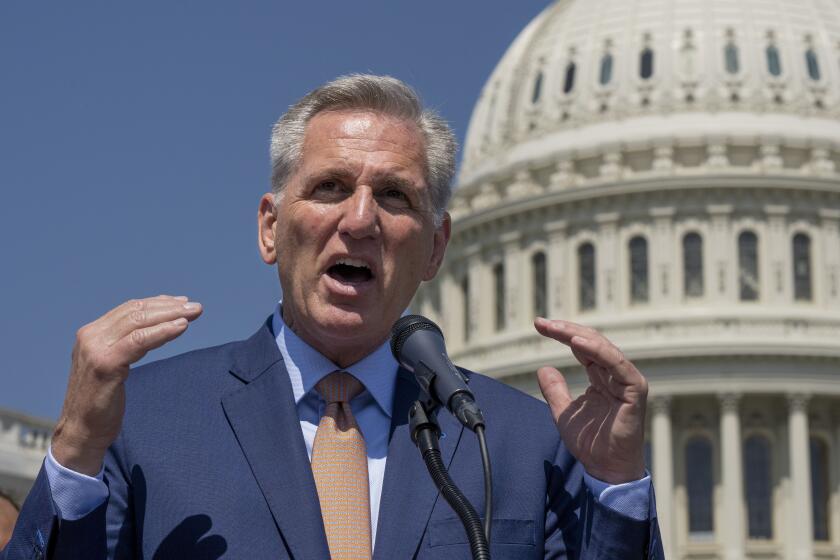Yellen says U.S. could hit debt ceiling as soon as June 1

- Share via
WASHINGTON — Treasury Secretary Janet L. Yellen notified Congress on Monday that the U.S. could default on its debt as early as June 1, if legislators do not raise or suspend the nation’s borrowing authority before then and avert what could potentially become a global financial crisis.
In a letter to House and Senate leaders, Yellen urged Congress “to protect the full faith and credit of the United States by acting as soon as possible” to address the $31.4-trillion limit on its legal borrowing authority. She added that it is impossible to predict with certainty the exact date of when the U.S. will run out of cash.
“We have learned from past debt limit impasses that waiting until the last minute to suspend or increase the debt limit can cause serious harm to business and consumer confidence, raise short-term borrowing costs for taxpayers, and negatively impact the credit rating of the United States,” she said in the letter.
Also Monday, the Congressional Budget Office reported that it saw a greater risk of the U.S. running out of funds in early June. CBO Director Phillip L. Swagel said because of less-than-expected tax receipts this filing season and a faster IRS having processed already received returns, “Treasury’s extraordinary measures will be exhausted sooner than we previously projected.”
In January, Yellen sent a letter to congressional leaders, stating that her department had begun resorting to “extraordinary measures” to avoid a federal government default.
The Treasury said Monday it plans to increase its borrowing during the April-to-June quarter of this year, even as the federal government is close to breaching the debt limit.
The U.S. plans to borrow $726 billion during the quarter. That’s $449 billion more than projected in January, due to a lower beginning-of-quarter cash balance and projections of lower-than-expected income tax receipts and higher spending.
In January, the U.S. government ran up against its legal borrowing capacity of $31.381 trillion, and the Treasury Department began implementing ‘extraordinary measures’ to avoid a default.
While Russia’s invasion of Ukraine remains a burden on U.S. economic growth, Treasury officials say the debate over the debt ceiling poses the greatest risk to the U.S. financial position.
Eric Van Nostrand, acting assistant secretary for economic policy, said in a statement that “even if Congress ultimately raises the debt limit before a default occurs, the ensuing uncertainty could raise borrowing costs and induce other financial stress that would weaken our labor market and our standing in the world.”
“There is no time to waste,” said Shai Akabas, director of economic policy at the Bipartisan Policy Center, which forecasts the so-called X-date when the government exhausts its extraordinary measures. His organization will also provide an updated X-date projection in the coming days, he says.
“The U.S. government is again within mere months or even weeks of failing to make good on all its obligations. That is not a position befitting of a country considered the bedrock of the financial system, and only adds uncertainty to an already shaky economy.”
Democrats and the White House are pushing for Congress to increase the federal debt limit. President Biden wants the cap raised without negotiation. The House Republican majority has most recently passed a bill to secure spending cuts in exchange for a debt limit increase. Biden on Monday invited the four congressional leaders to the White House on May 9 to discuss the matter.
Yellen said last week, at the Cap-to-Cap policy conference in Washington, that “Congress must vote to raise or suspend the debt limit, and it should do so without conditions and it should not wait until the last minute. I believe that is a basic responsibility of our nation’s leaders to get this done.”
More to Read
Get the L.A. Times Politics newsletter
Deeply reported insights into legislation, politics and policy from Sacramento, Washington and beyond. In your inbox twice per week.
You may occasionally receive promotional content from the Los Angeles Times.











